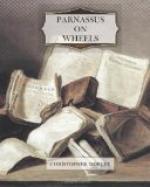I jumped out of the bunk, cracked my shins against something, and uttered a rousing halloo. Parnassus stopped, and the Professor pushed back the sliding window behind the driver’s seat.
“Heavens!” I said. “Father Time, what o’clock is it?”
“Pretty near supper time, I reckon. You must have fallen asleep while I was taking money from the Philistines. I made nearly three dollars for you. Let’s pull up along the road and have a bite to eat.”
He guided Pegasus to one side of the road, and then showed me how to light the swinging lamp that hung under the skylight. “No use to light the stove on a lovely evening like this,” he said. “I’ll collect some sticks and we can cook outside. You get out your basket of grub and I’ll make a fire.” He unhitched Pegasus, tied her to a tree, and gave her a nose bag of oats. Then he rooted around for some twigs and had a fire going in a jiffy. In five minutes I had bacon and scrambled eggs sizzling in a frying pan, and he had brought out a pail of water from the cooler under the bunk, and was making tea.
I never enjoyed a picnic so much! It was a perfect autumn evening, windless and frosty, with a dead black sky and a tiny rim of new moon like a thumb-nail paring. We had our eggs and bacon, washed down with tea and condensed milk, and followed by bread and jam. The little fire burned blue and cozy, and we sat on each side of it while Bock scoured the pan and ate the crusts.
“This your own bread, Miss McGill?” he asked.
“Yes,” I said. “I was calculating the other day that I’ve baked more than 400 loaves a year for the last fifteen years. That’s more than 6,000 loaves of bread. They can put that on my tombstone.”
“The art of baking bread is as transcendent a mystery as the art of making sonnets,” said Redbeard. “And then your hot biscuits—they might be counted as shorter lyrics, I suppose—triolets perhaps. That makes quite an anthology, or a doxology, if you prefer it.”
“Yeast is yeast, and West is West,” I said, and was quite surprised at my own cleverness. I hadn’t made a remark like that to Andrew in five years.
“I see you are acquainted with Kipling,” he said.
“Oh, yes, every governess is.”
“Where and whom did you govern?”
“I was in New York, with the family of a wealthy stockbroker. There were three children. I used to take them walking in Central Park.”
“Did you ever go to Brooklyn?” he asked abruptly.
“Never,” I replied.
“Ah!” he said. “That’s just the trouble. New York is Babylon; Brooklyn is the true Holy City. New York is the city of envy, office work, and hustle; Brooklyn is the region of homes and happiness. It is extraordinary: poor, harassed New Yorkers presume to look down on low-lying, home-loving Brooklyn, when as a matter of fact it is the precious jewel their souls are thirsting for and they never know it. Broadway: think




